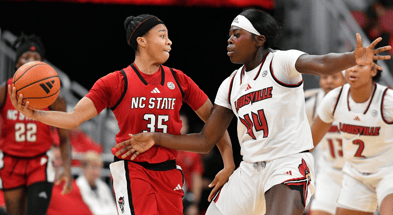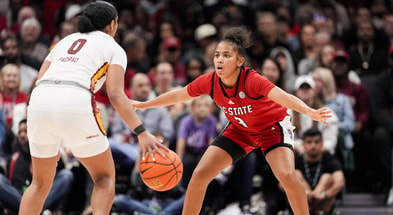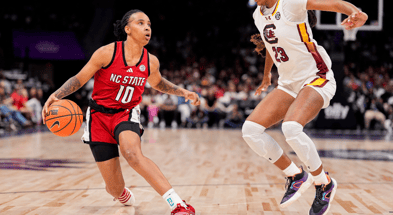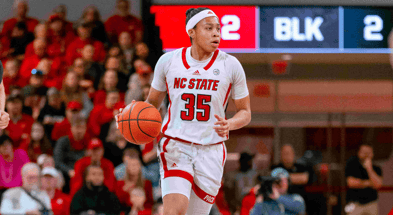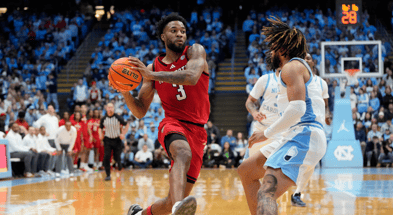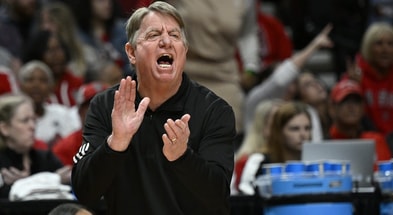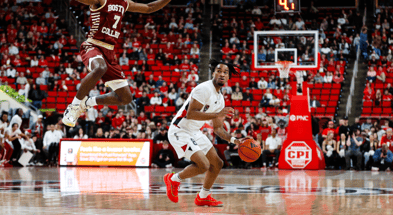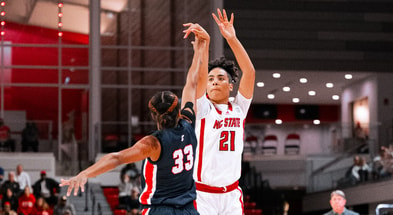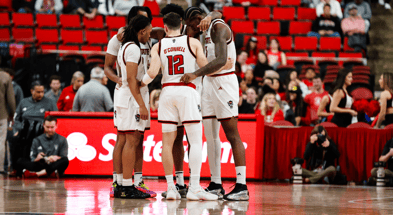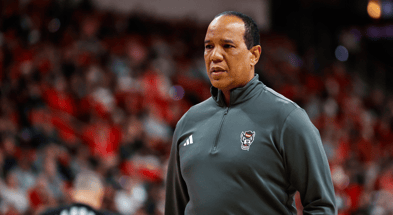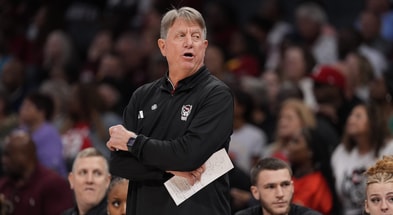NC State basketball 1970 ACC champs reuniting Thursday
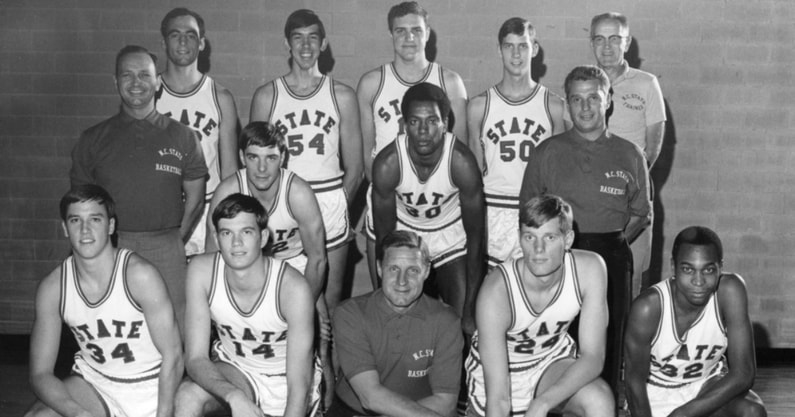
After a year-long COVID delay, the NC State basketball team that won the 1970 Atlantic Coast Conference championship in Charlotte will reunite this week to remember the first championship of the coach Norm Sloan era.
The players and coaches will be recognized at Thursday night’s game against Bethune-Cookman at Reynolds Coliseum, the court where they played their home games during that championship season.
Below is a recap of that season, in which Sloan’s Wolfpack slayed an ACC-unbeaten South Carolina squad that featured two-time ACC Player of the Year John Roche and future Georgia Tech head coach Bobby Cremins.
This story was originally published in a 2020 edition of The Wolfpacker Magazine.
BY TIM PEELER
The stars – well, at least the one closest to Earth – aligned perfectly for one of the biggest upsets in ACC tournament history.
Fifty years ago, on March 7, 1970, NC State basketball took on No. 3 South Carolina in the title game at the Charlotte Coliseum, with the Gamecocks hoping to stay on its season-long roll.
And the surprising outcome of that title game overshadowed the solar eclipse that covered 95 percent of North Carolina earlier that day.
Led by junior All-American and returning ACC Player of the Year John Roche, point guard Bobby Cremins and three towering inside players – 6-10 sophomore Tom Riker, 6-8 forward John Ribock and 6-10 center Tom Owens – the Gamecocks lived up to their preseason hype, sweeping through the ACC season undefeated, winning its 14 league games by an average of 16.2 points.
The only regular-season blemishes the Gamecocks, who were the consensus No. 1 team going into the season, suffered were home losses to unranked Tennessee in December and No. 13 Davidson in February.
Head coach Frank McGuire’s team headed into the ACC tournament in crowing-cock fashion, with five consecutive wins over its Big Four neighbors. It beat Duke at home, went on the road to defeat NC State, North Carolina and Wake Forest, then finished out the season with an 85-69 victory over head coach Norm Sloan’s Wolfpack to become just the third team in ACC history to go through a season without a league loss.
And, the Gamecocks had a little extra motivation: the NCAA East Regional was going to be played on South Carolina’s home court, the Carolina Coliseum, in front of an adoring crowd. McGuire and his charges were all but certain they had a clear path to the NCAA semifinal weekend (now known as the Final Four) in College Park, Maryland.
For Sloan, it had been an important season in establishing a NC State basketball program that dominated the early 1970s. After a non-competitive first season in 1966-67, an unlikely ACC Tournament finals run in 1968 and a fourth-place regular-season finish and first-round tournament elimination in 1969, Sloan needed a season of success to counter his neighborhood competition. Wake Forest (1962), Duke (1964, ’66) and North Carolina (1967-69) had gone to a combined seven Final Fours in the 1960s, while the Wolfpack’s only ACC title was a surprise upset as the team made the transition from Everett Case to Press Maravich.
McGuire, however, got all the attention that season. Just as he had done at North Carolina 13 years earlier, the ACC’s godfather relied on his New York pipeline to build a basketball power. Maybe one good enough to challenge UCLA’s dynasty, something that Wake, Duke and Carolina had not been able to do.
On paper, the Wolfpack had a small roster of just 10 players, none of whom were exactly recruiting stars. Sloan called it his “bargain-basement team.”
“For what we had, we were way overachievers,” says Vann Williford, a senior forward that season who averaged a double-double. “We were not exactly a bunch of five-star recruits, but we were well-coached and well-disciplined.
Williford, a native of Fayetteville, was Sloan’s first-ever recruit, a last-minute replacement when superstar Pete Maravich finally exhausted all of his options to make the ACC’s rigorous 800 SAT score and decided to go to LSU, taking his father with him as head coach. It left two seemingly unfillable holes in a Wolfpack program that had dominated the first two decades of the ACC under Case.

Williford, a three-year starter, developed into an All-ACC player who averaged 23.7 points and 10 rebounds in his final year.
Sophomore center Paul Coder stood just 6-foot-9, but he came within six rebounds of also averaging a double-double (16.8 points, 9.8 rebounds) for the season, despite playing against bigger competition. He was joined inside by 6-foot-6 senior forward Rick Anheuser, a transfer from Bradley two years earlier who also averaged in double figures, and junior muscleman Dan Wells, known for his intense play inside.
The Wolfpack had a historic backcourt comprised of New Jersey-born sophomore guard Ed Leftwich, NC State’s first scholarship African American player. Leftwich was a talented, but streaky, player capable of putting up big numbers, in the manner of North Carolina All-American Charlie Scott. Point guard Al Heartley of Clayton, NC State’s first varsity African American basketball player, was a walk-on who earned his way onto the team via an all-campus tryout the season before. Heartley split time at the point with junior Joe Dunning.
“That was such a dream season for me,” Heartley says. “I had watched the ACC tournament all those years in Reynolds Coliseum and I had watched the CIAA tournament. To play for a championship was a dream come true.”
Jim Risinger, Rennie Lovisa and Doug Tilley all saw limited time for Sloan’s team, but helped maintain what Williford and Heartley both praised as outstanding team chemistry for a team that averaged 83.7 points a game.
State won 16 of its first 17 games, falling only at Chapel Hill, through the first three months of the season, rising as high as No. 5 in the nation in the Associated Press Top 20. The Wolfpack knew it could run and score, putting up 244 points in its first two games, a 105-59 win over the Citadel and 139-78 victory over Atlantic Christian.
February, however, was not kind to the short-benched team. The Pack lost five of its final seven regular-season games, including a non-conference loss to Georgia Tech in the North-South Doubleheader on the same Charlotte Coliseum court that was to host the ACC tournament.
Three of those losses – to UNC, South Carolina and Duke – were by only two points, though, so despite the setbacks, the Wolfpack didn’t believe the walls were crashing in on them.
Top 10
- 1New
Ole Miss pulls upset
Rebels beat no. 4 Vols
- 2
Jai Lucas
Miami hiring Duke assistant
- 3
Greg Sankey
Claps back at Danny Kanell
- 4
Strength of Schedule
CFB 2025 Top-40 slates ranked
- 5
Brent Venables
OU coach snaps about defense
Get the On3 Top 10 to your inbox every morning
By clicking "Subscribe to Newsletter", I agree to On3's Privacy Notice, Terms, and use of my personal information described therein.
“We were in those games, but we just couldn’t close them out,” Heartley says. “So we didn’t feel like we had to take a backseat to South Carolina or anybody else. We thought we could win the ACC.”
After taking its lumps late in the season, the Wolfpack had regained some confidence by the ACC Tournament, despite losing 85-69 to the Gamecocks in Raleigh. Sloan’s squad breezed past Maryland in the first round, and survived a scare in the second round against Virginia, when Anheuser tipped in a missed shot with 39 seconds to play.
The Gamecocks also had a close game in the first round, as arch-rival Clemson played a slow-down game. South Carolina prevailed when Roche hit a pair of free throws with eight seconds remaining. Wake Forest didn’t present much of a challenge in the semifinals, but something significant did happen: with 11 minutes remaining in the game, Roche suffered a severely sprained ankle in a collision with Deacon guard John Lewkowicz.
With Roche injured, the Gamecocks weren’t quite the same team that had dominated the league in the regular season. The sun disappeared for more than two minutes during the afternoon eclipse on championship Saturday, and Roche was in the dark most of the evening.
Sloan had his team slow the tempo of the game, further leveling the playing field. The Gamecocks jumped out to an early 11-point lead in the first half, despite Roche’s ineffective play. For the game, the two-time ACC Player of the Year made just four of 17 shots in the game and scored only nine points.
Despite trailing 24-17 at intermission, Sloan opened the second half in the same slow-down game he had used so effectively two years before in a 12-10 semifinal upset of Duke. The Pack held the ball for nearly six minutes without forcing the action. McGuire eventually pulled his team out of its 2-1-2 zone, a fatal move that allowed the Wolfpack to tie the game by the end of regulation.
“McGuire was too arrogant to stay in the zone,” Williford said. “He just couldn’t do it. He came out and forced us to play and we were able to come back. It was pure coaching genius on Norm’s part.”
At the end of regulation, the game was tied 35-35 and Roche missed a potential game-winning shot in the final minutes. He did the same at the end of the first overtime.
Late in the second overtime, South Carolina’s Cremins dribbled the ball past half court and was looking for an open teammate. As he took his eye off his defender, Leftwich slapped the ball out of Cremins’ hands and drove down the court for the game-winning layup, giving the Wolfpack a 42-39 win and its sixth ACC basketball title. McGuire and the few South Carolina fans at the arena howled that Cremins had been fouled, something many believe a half century later.
Cremins went into hiding in the North Carolina mountains for weeks after the game, because the Gamecocks weren’t allowed to compete in the National Invitation Tournament. An arcane rule of the time prevented a team that was hosting an NCAA regional from playing in the NIT. The disappointment from that season was one of many factors that pushed South Carolina to leave the ACC in 1971.
Williford, Sloan’s first recruit, was named the tournament’s MVP, becoming the second NC State basketball player to win it after it was renamed in 1965 to honor Case.
The next week, the Wolfpack lost to Bob Lanier-led St. Bonaventure in the first round of the NCAA East Regional in Columbia, which was a highly hostile place for Sloan’s team to play the week after its upset of the Gamecocks.
Williford tried valiantly to lead his team to victory, with a 35-point, 12-rebound effort in the 80-68 loss. The next night, the Wolfpack beat Niagara 108-88 in the regional consolation finals.
Despite the short stay in the NCAA Tournament, the “Bargain Basement Pack” was still ACC champions.
“We achieved much more that what people expected,” Williford says. “That all goes back to Coach Sloan, who never got the recognition he deserved for being a great coach.”
Tim Peeler is a regular contributor to The Wolfpacker and can be reached at [email protected].
——
• Talk about NC State basketball inside The State of Basketball
• Subscribe to our podcast on iTunes
• Subscribe to our YouTube channel
• Learn more about our print and digital publication, The Wolfpacker
• Follow us on Twitter: @TheWolfpacker
• Like us on Facebook



